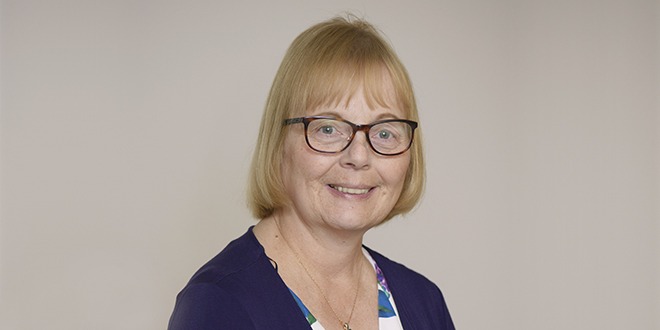People with type 2 diabetes write back to their younger selves, to share personal insights and reflect on their experience of living with diabetes and starting on insulin therapy. In this post, Christine reflects on living with diabetes.
Now retired at age 67, Christine was exactly the kind of nurse you’d hope for if you ever needed one. Confident, energetic and kind, she cared for patients in the intensive care unit and other departments of a New Jersey hospital for 23 years, before she switched jobs and began working in an ophthalmologist’s office. She was fully engaged outside of work too, with raising her sons and participating in a full roster of church activities.
Though Christine took insulin to treat gestational diabetes for her first pregnancy, with Edward, and seven years later for her third pregnancy, with Stephen, she discontinued using it after their births. Twelve years went by, wonderfully busy and active. Then Edward was diagnosed with type 1 diabetes at age 12. Christine was upset. Though she didn’t believe she was necessarily responsible, she began to feel guilty after some relatives suggested that she ‘had made Edward sick.’ Seven years later when Stephen, too, was diagnosed with type 1 diabetes, she remembers, “I just submerged myself in guilt.”
In the middle of that awful period, Christine’s marriage began falling apart. Around the time she got divorced, at 42, she was diagnosed with type 2 diabetes and began taking oral medication. Within a few years, a doctor she knew through her work at the hospital told Christine that it was time to add insulin to her existing treatment plan to manage her blood sugar levels. She refused and insisted on continuing with pills. She recalls the doctor, who was familiar with her strong will, sighing and saying: “OK. Have it your own way, Chris.”
Then came a phone call that changed everything. The words she never expected to hear were: “Your son is in the hospital.” At age 28 Edward had suffered a stroke as a result of diabetes-related complications. Years later, in 2014, Edward passed away following a heart attack and kidney failure from additional long-term diabetes complications.
Christine is writing to herself several years before Edward’s stroke, at the moment her doctor first advised her to add insulin to her treatment plan.
Dear Christine
Why are you so self-righteous and self-centred that you think you can ignore your diabetes diagnosis? Why do you think you are exempt from needing insulin? You are letting fear of the disease overcome practicality. As a nurse, you should know better. You can help others – it’s your profession for goodness sakes! – yet you cannot help yourself.
What you are afraid of, Christine, is blame. You are paralysed by the thought that perhaps you really are to blame for your two sons’ diabetes. Your sense of guilt is already so strong. You are afraid that taking insulin will amount to some sort of ‘proof’ that you truly are the culprit. Then you and everyone else will know about your flaw and the harm it has done.
Please, reconsider. It would be better to embrace the disease and challenge it. Knowledge is part of the power of overcoming and succeeding. Be more accepting. Don’t refuse insulin and refute the very drug that will help you. If you accept the treatment, you will be able to slow the progression of neuropathy and retinopathy. Perhaps your feelings of failure will diminish – and your anxiety regarding injections, people’s opinion of you and your flaw.
Even more important: if you take care of yourself you will show your sons how to be in better control of their diabetes. You don’t need to feel guilty. Suck it up, Chris, and do what you know you need to do.
With understanding,
Christine
This story has been edited by Ellyn Spragins and shared with support from Novo Nordisk Canada. The views and opinions expressed are not representative of Novo Nordisk, and should not be considered treatment advice. Novo Nordisk has permission to share this letter and included personal details.
 Diabetes Care Community Learn, connect and care
Diabetes Care Community Learn, connect and care




